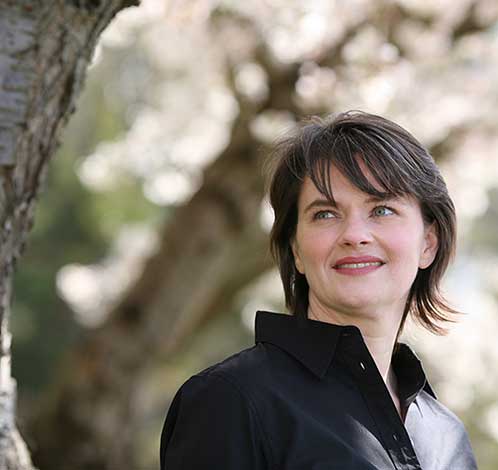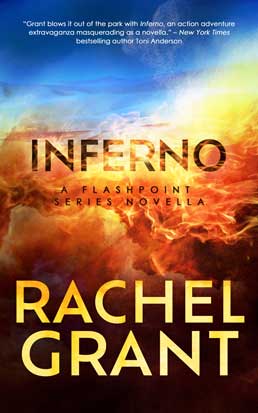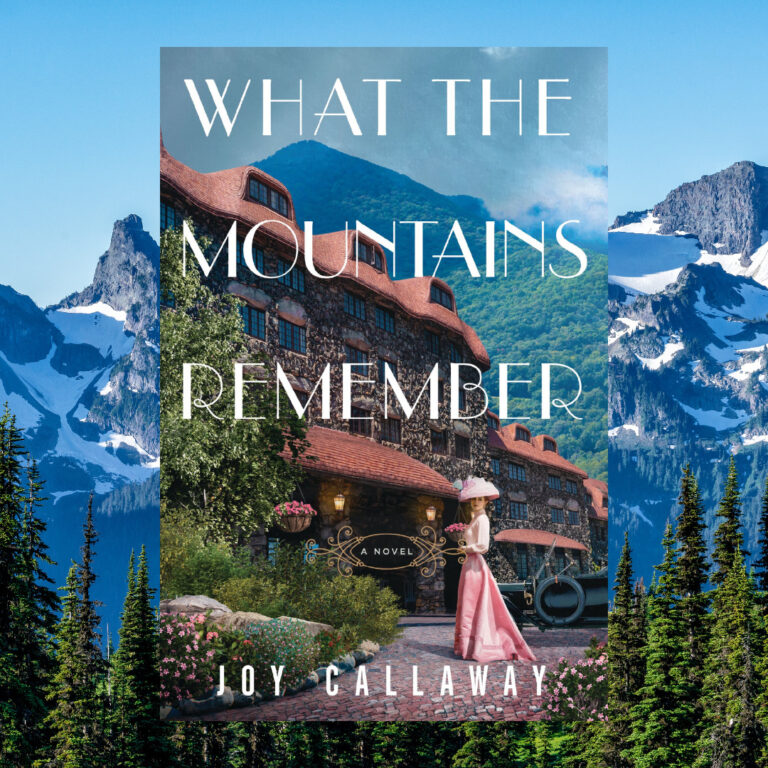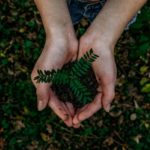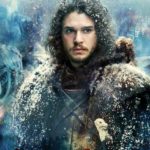What do a fake sheikh, a Russian oligarch and an American traitor have in common? They’re major players in Inferno, the newest installation of Rachel Grant’s exciting Flashpoint series set in Djibouti, South Sudan, Morocco, Tanzania, and DR Congo. If you’ve been keeping up with the award-winning series, then you know these sexy military thrillers focus on an Army Green Beret team stationed at Camp Citron in Djibouti and the badass women working or stationed in the region.
One of Grant’s trademarks is the sheer badassery of the women in her stories, and the Flashpoint books are no different. From the archaeologist protecting an ancient find in Tinderbox to the American aid worker who’s abducted in Catalyst, and the CIA operator who helps stop a coup and finds a conspiracy that could ignite all of Africa in Firestorm, they are smart enough—ballsy enough—to be agents of change. And though Inferno is a novella, it packs a real wallop.
We’re back with another Green Beret A-Team member, Sergeant Carols Espinosa, who is able to step in as a last-minute date for US Embassy Officer Kaylea Halpert at a black-tie event at a dangerous foreign national’s lavish home. But it’s quickly obvious that the Saudi businessman positioning himself as a “great philanthropist and benefactor in Djibouti” isn’t what he seems. Their attraction is as real as the treachery threatening relations between the US and Djobouti, but they’re professional enough to put it aside long enough to figure out who’s trying to use them as the fall guy. Carlos said it best: “Craziest. First date. Ever.”
I had the distinct honor of catching up with Rachel this week to dig a little deeper into her life as an archaeologist and to get the inside scoop on what makes this scientist such an addictive romantic suspense author.
Grant began writing her first novel in sixth grade—an Agatha Christie-inspired romantic mystery—and by her senior year in high school knew she wanted to write fiction. In college she changed her major from English to anthropology because “I had enough ego to feel that I already knew how to write and so I wanted to study something that interested me—to give me real world experiences that would be fodder for the fiction I planned to write. I decided on archaeology because it sounded fascinating and merged well with my love of history.” One Bachelor of Arts in anthropology with a minor in history later, with a job working for a small contract archaeology firm doing field and lab work, her trajectory was set.
“Archaeology straddles the boundary between soft and hard sciences (i.e., it is a sub discipline of anthropology that relies on hard science to reveal past culture). A multi-disciplinary approach is necessary because the field covers all of human prehistory and history, everywhere on Earth, and methods that work for studying one place and time might not work in others. Archaeologists are always looking to adopt and adapt methodologies from other disciplines to find new techniques and approaches to answer research questions about the past. This lack of boundaries in place, time, and technique is why it appeals to those with a thirst to learn new things….and why it is so rich for fiction.”
Her husband is also a source of fodder. “In the year before we got engaged, my husband wrote his Master’s Thesis and received his MA in nautical archaeology from Texas A&M, so I have his perspective and knowledge base to draw upon. He’s also been working as an archaeologist for the Department of Defense for over 20 years, so he keeps me up to date on what’s going on in the world of Cultural Resource Management and in particular how it intersects with the military—which has been a strong component in most of my books, especially the Flashpoint Series.”
Dolly: You put the ‘A’ in ‘STEM’ – do you think the arts are as important as sciences?
Rachel: As research for my next book, I’m listening to audiobooks (my favorite way to research) about theoretical physics. In the book, The Greatest Story Ever Told—So Far by Lawrence M. Krauss, Krauss shares a story of actor Alan Alda speaking at a public event and saying, “art requires hard work, and science requires creativity.” Krauss goes on to add, “While both require both, what I like about his version is that it stresses the creative, artistic side of science. I would add to this statement that both endeavors require intellectual bravery” (Krauss, 2017, ch 4).
I love this statement because I do think that it’s through art that we can make the sciences and other subjects approachable. In my book, Catalyst, I share a lot of information about the plight of South Sudan and also the issue of young girls in the developing world not attending school because they have no way to manage their period. Few who picked up that book likely expected or hoped to learn about either topic, but I’ve received many emails from readers who were thankful for learning something about both subjects, and who planned to donate to charities to help the people of South Sudan and/or girls in the developing world.
What advice do you have for young people who are interested in a career in science? Are there still things to be discovered or has it all been found?
Currently my mind is being blown by my research into theoretical physics – even with the confirmation of the Higgs boson particle 2012, the amount we don’t know about the universe is vast. And for people who are interested in archaeology and history, lidar mapping technology (discussed in Covert Evidence and explored at length in Poison Evidence) is expanding what we can find and how we can find it—without being a destructive process, as with traditional excavation.
I don’t know if I’m the best person to offer advice given that I haven’t worked in the field in over 15 years, but I can offer encouragement. As with the above quote, I think science and art are intertwined and can fulfill both passions. I wish I’d been able to delve deeper into harder sciences; I wish I were an expert on something instead of just scratching the surface. But I do fulfill my longing to know more about science and history every time I dive into research for my next book. And I need experts to keep writing books that break down difficult subjects for people like me. So, go forth and study science and history and then write up your findings for me so I can sprinkle it into my next book!
What is the most important piece of writing to you – characters or plot?
I have an unfortunately scattered approach to writing. Sometimes my stories are inspired by the characters, sometimes the setting, and sometimes I have the plot idea first. Setting is usually integral and almost always the first thing I must decide on because the suspense stems from there. Setting is a character in my book, and setting is never generic or interchangeable. Firestorm would have been a different book if Cal’s mom was from Sierra Leone and not the Democratic Republic of the Congo, and Catalyst wouldn’t have had the same backdrop of civil war and famine if it had been set in Sudan and not South Sudan.
So, to answer your question: setting. 🙂
What is your writing process? Do you plot, and if you do, do you use a Kanban board or sticky notes? How long does it take you to conceive, write and finish a book?
It depends on the book. Sometimes I have the major turning points figured out as I start writing, other times I need to write 20 thousand words before I have a clue what’s going to happen. I often go on writing retreats with author friends and need to talk through turning points or the climax. I also make my husband go for long walks with me to listen to me ramble on about the story and poke holes in my ideas until I come up with a scenario that works. Talking through the story with a friend is a rather vital part of my process.
Author Gwen Hayes and I went on a writing retreat as I was drafting Inferno, and I kept tossing out ideas for her to consider. At one point I outlined an idea that would result in…well, the fiery inferno the book needed thanks to the title. Gwen said, “Sounds good, but why wouldn’t he just shoot him?”
This was, of course, a valid and idea-crushing point.
Are all of your books based on experiences you’ve had, or do you keep up with new scientific discoveries and methodologies and think ‘what if’?
Very few of my books are based on anything I’ve experienced. Often I start with an aspect of archaeology/anthropology/history that is different from public perception of the disciplines. I want to show readers that archaeology isn’t Indiana Jones or Lara Croft. Treasure hunters aren’t archaeologists—they are the villains. There are very few books with fictional archaeology that get the profession right.
I also draw from my husband’s experience and definitely do a lot of ‘what iffing’ when I learn about new discoveries or technology.
How about place – have you visited the exotic places you write about?
Sadly, no! I did go to Alaska as research for Incriminating Evidence, because the first draft of the book was terrible and I felt I needed to explore the setting. Of course, I’ve set books in the Pacific Northwest, DC area, and island of Oahu in Hawai’i, all places I’ve lived.
My husband has worked in interesting places that have inspired my books and I get to visit vicariously through him:
- Turkey (Covert Evidence)
- Palau (Poison Evidence)
- Djibouti (Tinderbox and Inferno)
Have you ever been in danger while on a job?
Only if you count rattlesnakes, black widow spiders, scorpions, or sliding down a talus slope into a cold river dangerous. But I was never bitten and managed to stop the slide before I fell in the river. My husband reminds me of the time I hit my head on a low hanging rock in the back of a cave when I was excavating there. Naturally it was the one time I wasn’t wearing my hard hat. It was the first time I understood what it means to “see stars” from a blow to the head. Good times.
I had no idea there was such a military presence/dependence on military for security. In the real world, do scientists work so closely with military personnel?
It depends on the area and situation. My husband works for the military, so he works directly with military personnel when in the field, but he never needed a bodyguard like Morgan in Tinderbox. It is a requirement for all federal employees to study the latest threat assessment and apply operational security pertinent to each situation/destination. In Djibouti, he did buy a knobkerrie for protection against the wild dogs. Fortunately, he never needed to use it.
On one of his trips to Djibouti, scientists with the Smithsonian Institution were there collecting specimens—because the flora and fauna of Djibouti are largely undocumented—and he joined the team of scientists for a day of specimen collecting, and all work was done using reasonable security precautions, but not necessarily under guard by US troops.
The attached photo was taken during that foray, but is not a specimen collected.

The only way to get Inferno is to buy her Flashpoint Series Collection, on sale through May 6 for $0.99. Worth it!
Inferno by Rachel Grant, out May 6th!
US Embassy Officer Kaylea Halpert needs a date for a black tie event at a dangerous foreign national’s lavish home. Preferably someone with brains and brawn who can watch her back. Special Forces Sergeant Carlos Espinosa is more than happy to escort the beautiful, brilliant diplomat—who just might be a CIA case officer—to the party. Their night together only gets hotter when he discovers Kaylea burns for him too. Date night in Djibouti turns deadly when foreign agents target the couple. But who is the intended victim, the covert operator or the Green Beret? As Carlos and Kaylea use their combined skills to escape their captors, they uncover treachery that could ignite relations between the US and Djibouti—already at a flashpoint—and trigger an inferno.

